Collapsed trachea in dogs is a progressive condition where the rings supporting the windpipe weaken, leading to partial or complete closure and restricted airflow. This often manifests as a characteristic “goose honk” cough, gagging, and difficulty breathing, especially during excitement or exertion. While veterinary intervention is crucial, many pet owners seek natural cough suppressant options to complement conventional treatments and improve their dog’s quality of life. This article explores effective natural methods that can help manage the symptoms of a collapsed trachea in dogs.
Understanding Collapsed Trachea and the Need for Natural Support
The trachea, or windpipe, is a vital tube made of C-shaped cartilage rings that keeps the airway open for breathing. In dogs with collapsed trachea, these rings lose their structural integrity, causing them to flatten and obstruct airflow. This condition is more common in certain breeds, like toy breeds, and can be exacerbated by factors such as obesity, age-related degeneration, and even excitement. The persistent coughing and breathing difficulties associated with collapsed trachea can significantly impact a dog’s well-being and lead to a reduced quality of life.
While medical treatments may involve medications to manage inflammation and prevent infections, or even surgical interventions in severe cases, many owners are looking for gentle, non-invasive natural cough suppressant strategies. These approaches aim to reduce irritation, ease breathing, and calm the dog, thereby lessening the triggers for coughing. It is paramount to remember that any natural treatment should be used under the guidance of a veterinarian, as it is intended to support, not replace, professional medical care.
Natural Approaches for Managing Collapsed Trachea Symptoms
Several natural methods can help alleviate the symptoms of collapsed trachea in dogs. These strategies focus on creating a supportive environment, using natural remedies, and adjusting lifestyle factors.
1. Weight Management: A Cornerstone of Respiratory Health
Excess weight is a significant contributor to the severity of symptoms in dogs with a collapsed trachea. Carrying extra pounds puts increased pressure on the trachea, making it harder for the windpipe to remain open and for the dog to breathe comfortably. This added strain can worsen coughing fits, labored breathing, and fatigue. Maintaining a healthy weight is therefore one of the most crucial natural cough suppressant strategies.
To help your dog achieve and maintain an optimal weight:
- Balanced Diet: Feed a nutritious, calorie-controlled diet with lean proteins. Your veterinarian can help you determine the appropriate portion sizes based on your dog’s breed, age, and activity level.
- Regular, Gentle Exercise: Engage in short, low-impact activities like gentle leash walks. Avoid strenuous exercise, especially in warm or humid conditions, as this can trigger coughing.
- Regular Monitoring: Keep track of your dog’s weight. If you encounter challenges, consult your vet for tailored diet adjustments or comprehensive weight management plans.
The benefits of a healthy weight are profound. It reduces pressure on the trachea, making breathing easier and decreasing the frequency and intensity of coughing episodes. A healthy weight also boosts overall well-being, improving your dog’s energy, mobility, and overall quality of life.
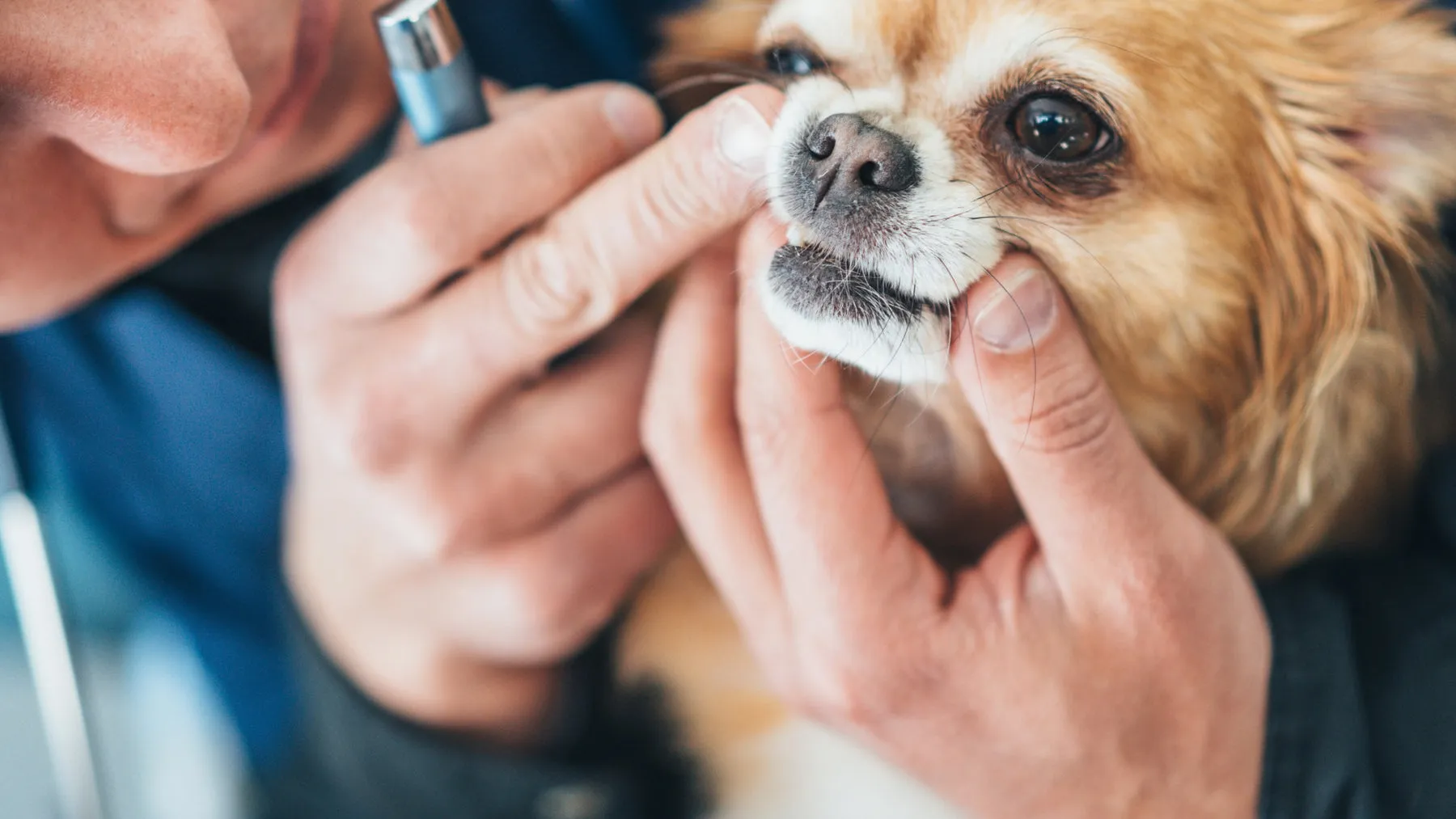 A dog being examined by a veterinarian in a clinic.
A dog being examined by a veterinarian in a clinic.
2. Environmental Control: Humidifiers and Air Purifiers
Environmental factors can significantly influence a dog’s respiratory comfort. Dry air, particularly prevalent during winter months or in arid climates, can irritate the throat and worsen coughing and breathing difficulties. Creating a more supportive indoor environment through the use of humidifiers and air purifiers can offer considerable relief.
- The Role of Humidity: Dry air causes the trachea to become irritated, which can trigger more coughing. Humidifiers add essential moisture to the air, soothing the respiratory tract and helping to prevent inflammation.
- Optimal Usage: Place a cool-mist humidifier near your dog’s resting area during dry periods. Consider using an air purifier equipped with a HEPA filter to reduce airborne irritants like dust and allergens, which can also trigger coughing. Regular cleaning of humidifier reservoirs and air purifier filters is essential for their effectiveness.
- Preventing Irritation: By maintaining proper humidity levels and reducing irritants, you create a comfortable breathing environment, helping your dog breathe more easily and reducing coughing episodes.
3. Herbal Remedies for Soothing Relief
Certain herbs possess properties that can naturally soothe the throat, reduce inflammation, and support respiratory health, acting as effective natural cough suppressants for dogs with collapsed trachea. However, it is vital to use these remedies safely and always under veterinary supervision.
- Marshmallow Root: Renowned for its mucilaginous content, marshmallow root forms a protective, soothing layer over the mucous membranes of the throat. This can significantly ease throat irritation and reduce coughing. Its gentle anti-inflammatory properties make it a favored choice for pets with respiratory issues.
- Licorice Root: This herb contains natural anti-inflammatory and soothing compounds that can help reduce inflammation in the throat and airways, making breathing easier. It can also act as an expectorant, aiding in the clearance of mucus. Caution is advised with licorice root, as prolonged use can lead to side effects, particularly in dogs with pre-existing conditions like high blood pressure.
- Mullein: Mullein is recognized for its ability to support respiratory function by reducing inflammation and calming irritated tissues in the airways. Like licorice root, it can also act as a mild expectorant.
These herbs can offer symptomatic relief by calming irritation and reducing inflammation, potentially leading to fewer coughing fits and improved comfort. Always consult your veterinarian before administering any herbal treatments to ensure safety, determine the correct dosage, and check for potential interactions with other medications.
4. Acupuncture and Acupressure: Traditional Approaches to Wellness
Acupuncture and acupressure, originating from traditional Chinese medicine, offer potential natural avenues for managing collapsed trachea symptoms in dogs. These techniques aim to alleviate discomfort, reduce inflammation, and promote relaxation, all of which can contribute to easier breathing and fewer coughing episodes.
- Acupuncture: Involves the insertion of fine needles into specific points on the body to stimulate healing, relax muscles surrounding the trachea, reduce inflammation, and improve respiratory function.
- Acupressure: A needle-free alternative, acupressure applies gentle pressure to these same specific points, promoting relaxation and easing discomfort.
While research specifically on acupuncture and acupressure for canine collapsed trachea is ongoing, anecdotal evidence and their established effects on pain and inflammation in both humans and animals suggest potential benefits. Many pet owners report improvements in breathing and reduced coughing after treatment. It is crucial to seek out a veterinarian certified in veterinary acupuncture or acupressure for safe and effective application.
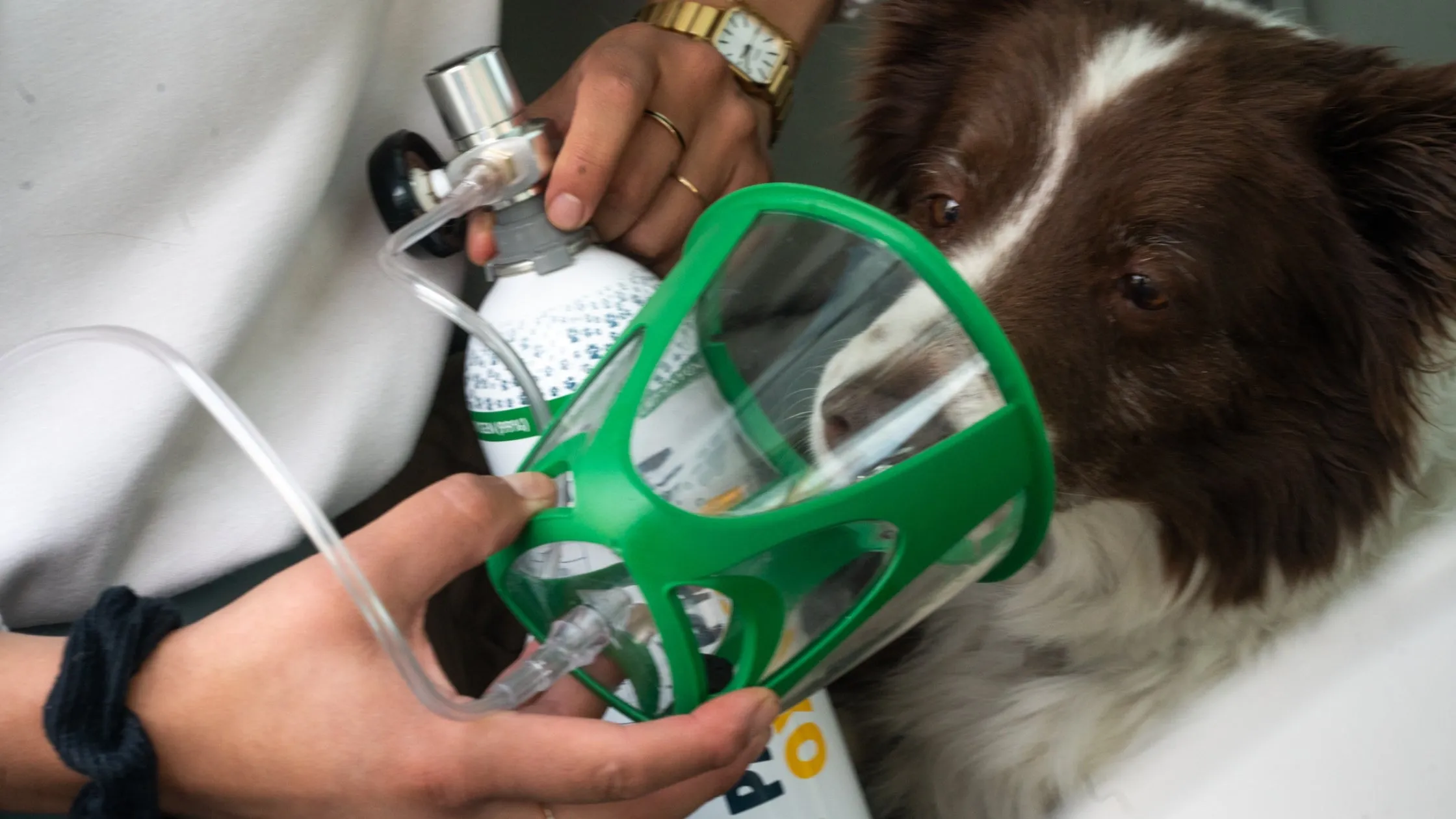 A dog receiving acupuncture treatment from a veterinarian.
A dog receiving acupuncture treatment from a veterinarian.
5. Aromatherapy for a Calming Atmosphere
Aromatherapy, when used cautiously and appropriately, can be a beneficial natural adjunct for dogs with collapsed trachea, particularly if stress and anxiety are contributing factors to their symptoms. Certain calming essential oils can help relax the muscles around the trachea, thereby easing breathing and potentially reducing the frequency of coughing fits.
- Beneficial Oils: Lavender and chamomile are well-known for their calming properties, which can help reduce anxiety in dogs. Frankincense may also support respiratory health through its relaxing and anti-inflammatory effects.
- Safe Application: The safest method is often through diffusion. Use a diffuser with a few drops of essential oil in a well-ventilated room. Always start with minimal amounts to gauge your dog’s reaction, ensuring the scent is not overwhelming. Gentle aromatherapy sprays made with water and a few drops of essential oil can also be lightly misted on bedding or resting areas.
Crucial Precautions: Not all essential oils are safe for dogs. Avoid oils like tea tree, peppermint, citrus oils (lemon, orange), eucalyptus, and cinnamon, as they can cause respiratory irritation, skin reactions, or more severe health issues. Always opt for high-quality, pet-safe essential oils. Ensure good ventilation so your dog can leave the area if they feel uncomfortable. Watch for any signs of distress, such as sneezing, coughing, or pawing at the face, and discontinue use immediately if adverse reactions occur. Always consult your veterinarian before introducing aromatherapy, especially if your dog has existing health conditions or is on medication.
6. Calming Supplements for Anxiety Reduction
Anxiety and stress can act as significant triggers for coughing episodes in dogs with collapsed trachea. Natural calming supplements can play a supportive role by promoting relaxation and reducing overall anxiety, which in turn helps dogs breathe more comfortably. These are particularly useful during stressful events like car rides, vet visits, or exposure to loud noises.
Natural Calming Agents:
- Chamomile: A gentle herb known for its mild calming effects, helpful for sensitive dogs. It can relax muscles and calm the nervous system, aiding in comfortable breathing.
- Melatonin: A natural hormone that regulates sleep and promotes calmness. It can be beneficial for reducing nighttime coughing and managing anxiety triggered by events like thunderstorms.
Importance of Vet-Approved Products: When selecting supplements, always prioritize high-quality, vet-approved products. Look for options specifically formulated for dogs and avoid human supplements unless directed by your veterinarian. Consult your vet to ensure the chosen supplement is appropriate for your dog’s specific health status, age, and weight, and to confirm safe dosages and potential interactions with existing medications.
7. Nutritional Support for Respiratory Well-being
A well-balanced diet is fundamental for supporting the overall health of dogs with collapsed trachea. Proper nutrition can help reduce inflammation, bolster the immune system, and improve the body’s ability to manage stress.
Key nutritional components include:
- Antioxidants: Found in foods like blueberries, spinach, and sweet potatoes, antioxidants help combat inflammation throughout the body.
- Omega-3 Fatty Acids: Rich sources like fish oil and flaxseed can significantly reduce airway inflammation and support cardiovascular health.
- Anti-Inflammatory Foods: Incorporating ingredients such as leafy greens, turmeric, and pumpkin can aid in managing systemic inflammation.
Specific supplements like fish oil (for omega-3s) and Vitamin E (as an antioxidant) can further support respiratory health and reduce tracheal inflammation. Always discuss dietary changes and supplements with your veterinarian to ensure they align with your dog’s specific needs and do not interfere with other treatments.
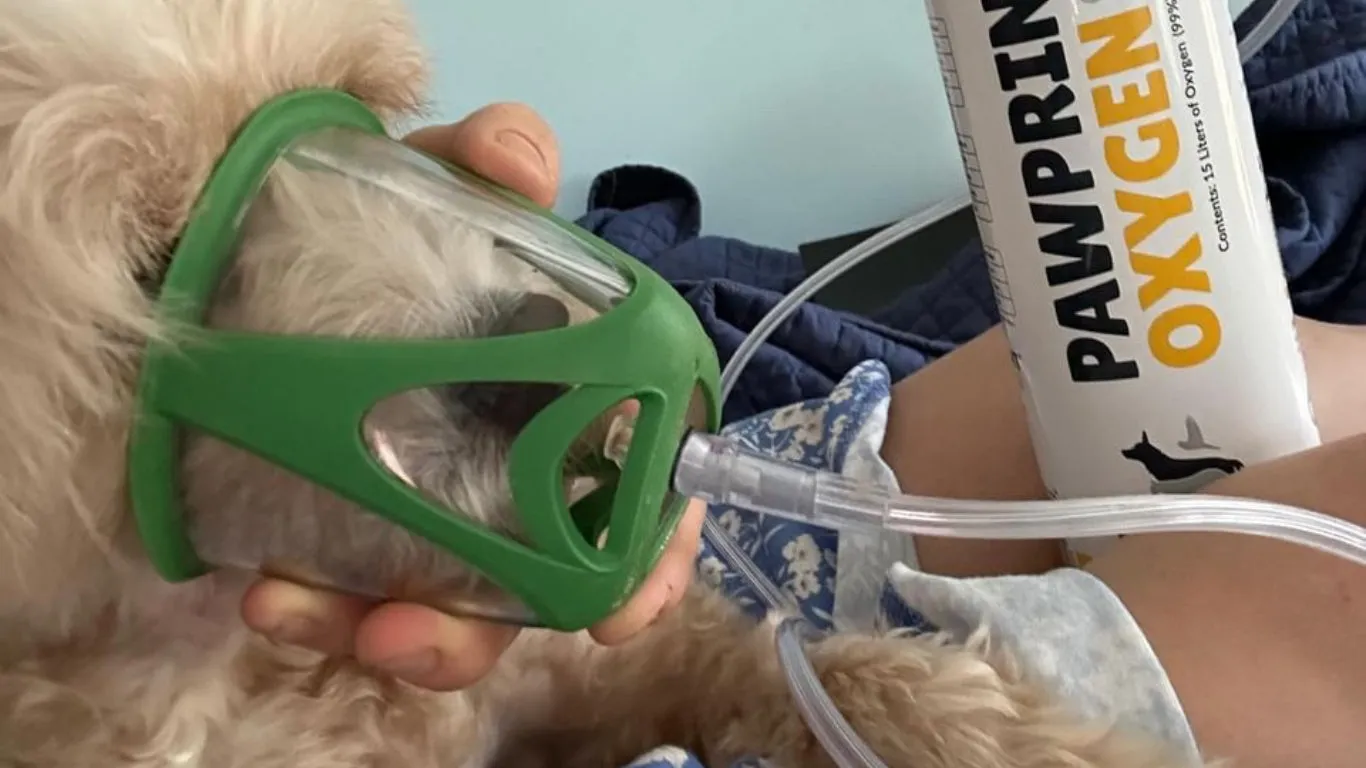 A close-up of a dog wearing an oxygen mask.
A close-up of a dog wearing an oxygen mask.
8. Oxygen Therapy: Immediate Support During Distress
Supplemental oxygen therapy can be a critical intervention for dogs experiencing respiratory distress due to a collapsed trachea. When the airway narrows, it restricts airflow, leading to difficulty breathing and increased coughing. Providing supplemental oxygen helps deliver essential oxygen to the lungs, reducing the strain on the respiratory system and enabling the dog to breathe more easily.
During acute episodes, supplemental oxygen helps maintain adequate oxygen levels in the bloodstream, supporting vital respiratory and cardiovascular functions. By lowering the effort required for each breath, oxygen therapy can alleviate discomfort and mitigate the risks associated with low oxygen levels.
- Types of Oxygen Therapy:
- Portable Oxygen Kits: These are designed for rapid deployment during emergencies or travel, offering quick support. Kits often include a pet-specific oxygen mask, a flow regulator, and portable oxygen canisters.
- At-Home Oxygen Concentrators: For dogs requiring regular or continuous support, oxygen concentrators are invaluable. These devices extract oxygen from ambient air and deliver it through a mask or specialized oxygen chamber, ideal for managing chronic respiratory issues.
Veterinary Guidance is Essential: Oxygen therapy should always be administered under veterinary guidance. Your veterinarian can determine the appropriate oxygen concentration and duration for your dog’s specific condition and demonstrate the correct use of equipment. If your dog experiences severe breathing difficulties that do not improve with oxygen, or shows signs of extreme weakness, lethargy, or cyanosis (bluish gums or tongue), seek immediate veterinary attention.
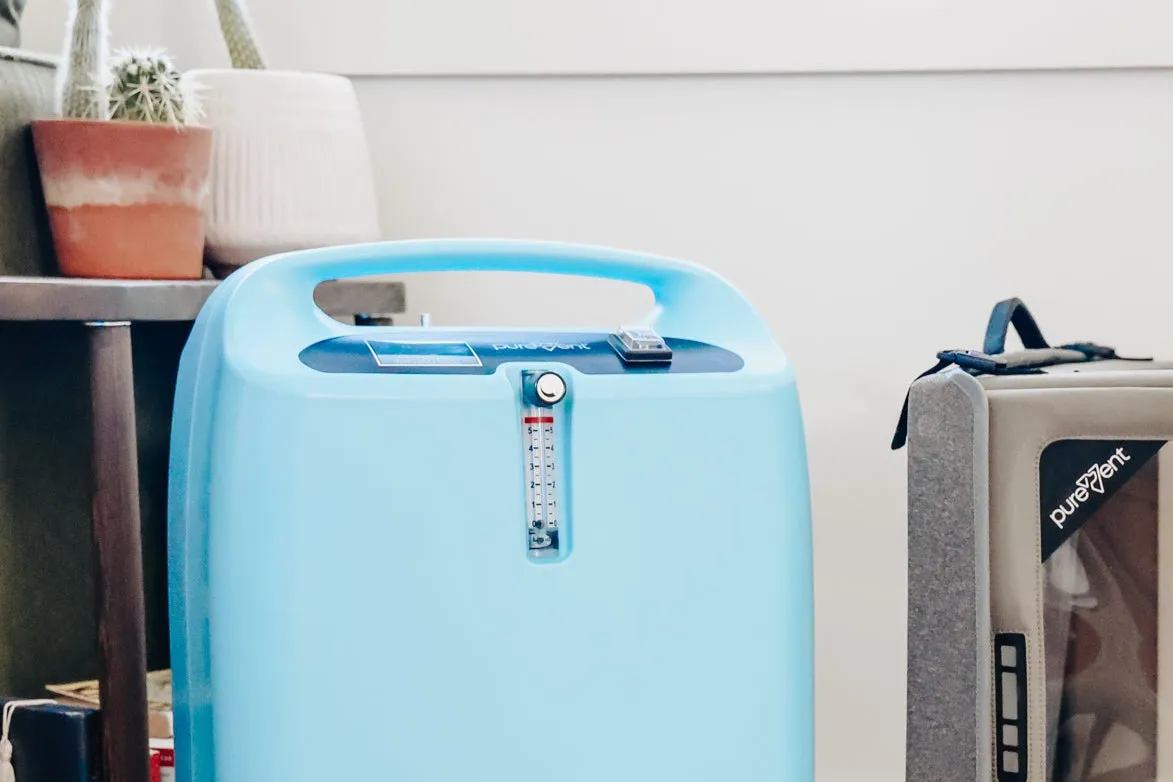 Purevent pet oxygen chamber and concentrator setup.
Purevent pet oxygen chamber and concentrator setup.
9. Maintaining a Cool Environment
Overheating can significantly worsen the symptoms of collapsed trachea in dogs. When a dog becomes too warm, they pant more vigorously, which can increase pressure on the trachea and make breathing even more challenging. Creating and maintaining a cool, comfortable environment is therefore a vital natural management strategy.
- Climate Control: Utilize air conditioning to maintain a stable, cool temperature indoors, especially during warmer months. Fans can also improve air circulation.
- Cooling Aids: Cooling mats and vests can provide external relief by absorbing body heat.
- Outdoor Precautions: Limit outdoor activities during the hottest parts of the day. Opt for early morning or late evening strolls. Always ensure access to shade and fresh water.
By keeping your dog cool, you reduce respiratory strain and minimize the risk of triggering coughing fits.
10. Elevated Sleeping Position for Easier Breathing
The sleeping position of a dog with a collapsed trachea can impact their ability to breathe comfortably. Elevating their head during rest helps keep the airways open, reducing pressure on the trachea and facilitating easier breathing. This simple adjustment can lead to more restful sleep and fewer coughing episodes throughout the night.
- Creating an Elevated Space: Use soft pillows or cushions to gently prop up your dog’s head. Some adjustable pet beds are designed with a slight incline for continuous head elevation. If your dog sleeps on furniture, consider pet steps or ramps to help them reach their elevated spot without strain.
Elevating your dog’s head while sleeping is a simple yet effective natural treatment that can significantly improve their breathing and overall comfort, contributing to a better quality of life.
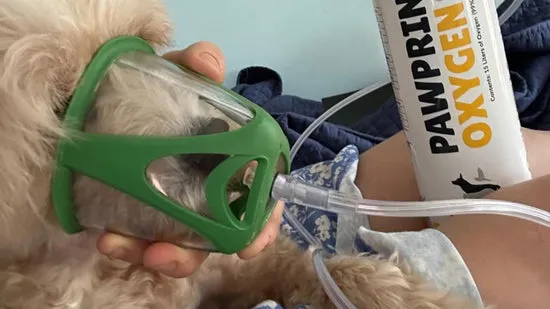 A dog resting comfortably with an oxygen mask.
A dog resting comfortably with an oxygen mask.
A Comprehensive Approach to Managing Collapsed Trachea
Managing a collapsed trachea in dogs requires a multifaceted approach, and natural treatments can offer effective, gentle ways to alleviate symptoms and improve your dog’s quality of life. While these natural strategies are beneficial, it is imperative to consult with your veterinarian before implementing any new treatment. They can provide personalized guidance on the most appropriate options for your dog’s specific condition, ensuring that any chosen therapies complement existing care plans and medications.
By addressing diet, environment, stress management, and utilizing supportive natural remedies, you can create a holistic care plan. Working closely with your veterinarian is key to effectively managing your dog’s symptoms, enhancing their comfort, and ultimately improving their overall well-being.
